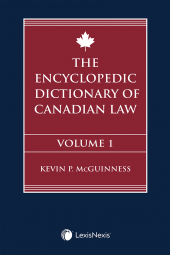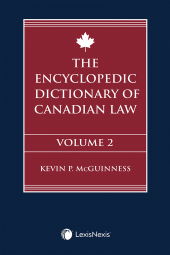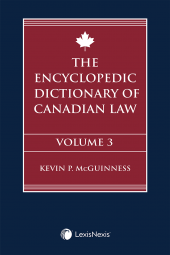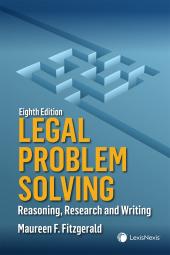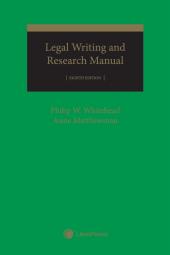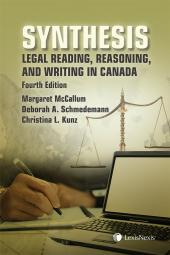The Encyclopedic Dictionary of Canadian Law (3 Volumes)
One Year Subscription Only Terms
Subscribers receive the product(s) listed on the Order Form and any Updates made available during the annual subscription period. Shipping and handling fees are not included in the annual price.
Subscribers are advised of the number of Updates that were made to the particular publication the prior year. The number of Updates may vary due to developments in the law and other publishing issues, but subscribers may use this as a rough estimate of future shipments. Subscribers may call Customer Support at 800-833-9844 for additional information.
Subscribers may cancel this subscription by: calling Customer Support at 800-833-9844; emailing customer.support@lexisnexis.com; or returning the invoice marked 'CANCEL'.
If subscribers cancel within 30 days after the product is ordered or received and return the product at their expense, then they will receive a full credit of the price for the annual subscription.
If subscribers cancel between 31 and 60 days after the invoice date and return the product at their expense, then they will receive a 5/6th credit of the price for the annual subscription. No credit will be given for cancellations more than 60 days after the invoice date. To receive any credit, subscriber must return all product(s) shipped during the year at their expense within the applicable cancellation period listed above.
Product description
***Winner of the 2022 Hugh Lawford Award for Excellence in Legal Publishing***
Having access to a reliable dictionary of legal terms is invaluable to lawyers, legal academics, judges and law students alike. The Encyclopedic Dictionary of Canadian Law fits the bill perfectly. This work provides the legal profession in Canada (and all others concerned with the law) with a concise yet comprehensive and definitive dictionary of the Canadian legal lexicon. It is written in language that is fully accessible to law students and the general public, even though the content is still authoritative for practitioners, legal academics and the bench.
Useful Content, From A To Z
Although heavily influenced by the American and British terminology from which it is derived, Canadian legal terminology differs from them both in several important respects. Many of these differences are fundamental and arise from the constitutions of the individual countries. For instance, in the United Kingdom, there is neither a written constitution nor an entrenched charter of rights. Despite the devolution of limited legislative authority to subordinate assemblies in Northern Ireland, Scotland and Wales, the constitution of the United Kingdom remains unitary. There are also important constitutional differences between Canada and the United States, such as in relation to the separation of powers, the distribution of powers between the federal government and provincial/state governments, and the rights accorded constitutional protection. This text takes all these differences into account. The result is a uniquely Canadian product – a vital distinguishing feature from other dictionaries on the market.
While focused on the laws of the common law provinces, this work is national in scope, as it includes definitions for hundreds of Quebec civil law terms. The dictionary is also unique in its approach. Although there have been a number of Canadian law dictionaries in the past, many have focused on the definitions given to legal terms in statutes or other legislation and have paid little attention to the manner in which terminology has been interpreted by the courts. By contrast, the more than 55,000 main entry definitions (and more than twice that number of secondary entries, bringing the total number of definitions to more than 165,000 terms) provided in this text are taken predominantly from both Canadian case and statute law, focusing in particular on statutes either of broad application or those statutes that exhaustively define a specific term for the law of Canada or a province. However, the work also includes important terms from academic disciplines (e.g. economics, sociology and political science), professions (e.g. accounting and medicine) and the business world that are of relevance to legal practice, research and study.
The Encyclopedic Dictionary of Canadian Law will be a vital tool for all legal professionals. Civil litigators can rely on it when drafting factums while contract lawyers will find it helpful for preparing contracts and legal opinions. In addition, it will assist the judiciary and members of administrative tribunals when choosing and defining specific terms in their decisions. Finally, this text will assist law professors when seeking to explain the law to students, and will also help law students and members of the general public to gain an understanding of Canadian law.
Table of contents
VOLUME 1: A-E
A – A AVER ET TENER to AYT
B – B2W to BYTE and BIT
C – C-DOLLY to CYTOTECHNOLOGY
D – D/L or DL to DYSURIA
E – E CONVERSO to EYRE
VOLUME 2: F-O
F – F.A.A. to FYEO
G – G2CU to GYRUES
H – H-HOUR to HYSTERIA
I – I-BEAM to IUSS
J – JAC to JYYC
K – KKK to KYRIARCHY
L – L.C. to LZAGU
M – M.D. to MYXOEDEMA
N – N1 to NYSTAGMUS
O – O’CONNOR, GEORGE BLIGH to OZONE PROTOCOL
VOLUME 3: P-Z
P – P-CARD PURCHASE to PYURIA
Q – Q METHODOLOGY to QUOVIS MODO
R – RA PROPERTY to RYLANDS V. FLETCHER
S – S.E.N.C.R.L. to SYSTEMIC RISK
T – T-1 GENERAL SLIP or T1 INCOME TAX AND BENEFIT RETURN to TYRANNY
U – UA to UZI
V – VACANCY to VULVITIS
W – W@ to WYNN
X – X-AXIS to XYZ AFFAIR
Y – Y-AXIS to YUKON RESEARCH AND DEVELOPMENT TAX CREDIT
Z – ZAFTIG to ZZZZ
 Lexis Nexis
Lexis Nexis 